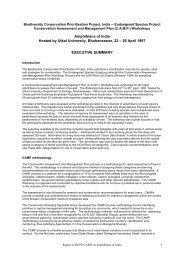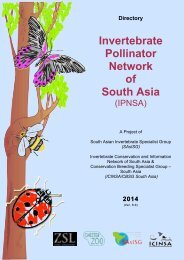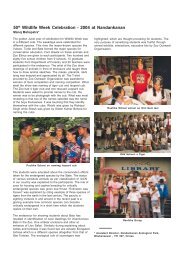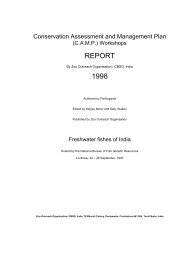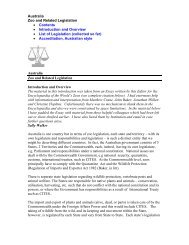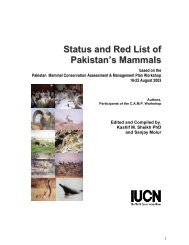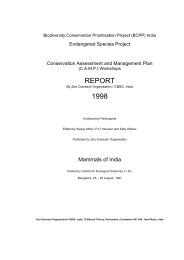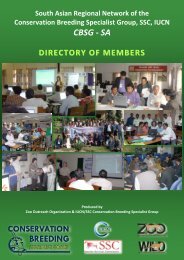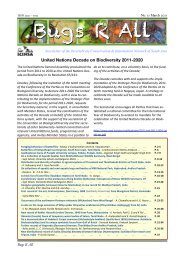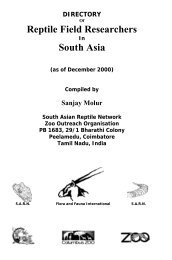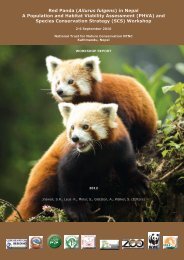South Asian Chiroptera CAMP report 2002 - Zoo Outreach ...
South Asian Chiroptera CAMP report 2002 - Zoo Outreach ...
South Asian Chiroptera CAMP report 2002 - Zoo Outreach ...
You also want an ePaper? Increase the reach of your titles
YUMPU automatically turns print PDFs into web optimized ePapers that Google loves.
Conservation Assessment and Management Plan (C.A.M.P.)Workshop for <strong>Chiroptera</strong> of <strong>South</strong> AsiaEXECUTIVE SUMMARYIntroductionA Conservation Assessment and Management Plan (C.A.M.P.) Workshop for <strong>South</strong> <strong>Asian</strong> <strong>Chiroptera</strong>assessed a total of 120 of the 123 species of bats occurring in <strong>South</strong> Asia according to the 2001 IUCN Red ListCriteria and made conservation, research and management recommendations on the basis of the assessments.The five-day workshop was conducted from 21-25 January <strong>2002</strong> at the Department of Animal Behaviour andPhysiology, School of Biological Sciences, Madurai Kamaraj University, Madurai. A total of 43 bat expertsincluding currently active field biologists from 25 scientific institutions from Nepal, Sri Lanka, India, Myanmar,U.K. and U.S.A. participated in the workshop.The workshop was facilitated and coordinated by the IUCN SSC Conservation Breeding Specialist Group’sregional network for <strong>South</strong> Asia (CBSG, <strong>South</strong> Asia). The IUCN/SSC <strong>Chiroptera</strong> Specialist Group wasrepresented by its Co-Chair. Other organizers and collaborators were the <strong>Chiroptera</strong> Conservation andInformation Network of <strong>South</strong> Asia (CCINSA), Department of Animal Behaviour & Physiology, MaduraiKamaraj University, <strong>Zoo</strong> <strong>Outreach</strong> Organisation (ZOO), and Wildlife Information & Liaison DevelopmentSociety (WILD). The workshop was sponsored by Chester <strong>Zoo</strong>/North of England <strong>Zoo</strong>logical Society, BatConservation International, Columbus <strong>Zoo</strong> Conservation Fund and Metro-Toronto <strong>Zoo</strong>.The workshop was also a five-year review of an earlier C.A.M.P. for Mammals of India conducted in 1997 atthe Centre for Ecological Sciences, Bangalore, under the auspices of the Biodiversity ConservationPrioritisation Project (BCPP) for India. The current exercise extended its mandate to the political unit of <strong>South</strong>Asia. The review aimed to rectify the 50% data deficienct species that characterized the 1997 assessments ofIndian bats by increasing the number of chiroptera specialists participating. For this a network of chiropterafield biologists was formed and provided with information and a series of tasks, which helped in bringingtogether biologists and data for the workshop.The C.A.M.P. ProcessThe Conservation Assessment and Management Plan (C.A.M.P.) Process was developed by the IUCN SSCConservation Breeding Specialist Group (CBSG) initially to assist zoos to prioritise species for conservationbreeding but now as a tool of IUCN for assessing species for the Red List of Threatened Animals and as ameans of assisting the regional and national biodiversity planning process. A C.A.M.P. workshop bringstogether a broad spectrum of experts and stakeholders (e.g., wildlife managers, biologists, representatives of theacademic community or private sector, researchers, government officials and captive managers) who contributedata from field studies which is used by the workshop to evaluate the current status of species, populations andhabitats and make recommendations for specific conservation-oriented research, management and publiceducation. C.A.M.P.s are run according to a philosophy of sharing information, resolving conflict, puttingconservation of species first and achieving consensus to forward conservation action.A C.A.M.P. Workshop is intensive and interactive which facilitates objective and systematic discussion ofresearch and management actions needed for species conservation, both in situ and ex situ. Information andrecommendations are compiled for each species on a Taxon Data Sheet, which also provides documentation ofthe reasoning behind recommendations of the criteria used for deriving a status. All assessments were ratifiedby participants in plenary sessions with much discussion ultimately leading to consensus within the workshop.The results of the initial C.A.M.P. workshops are reviewed by workshop participants in varying iterations andas a Report to experts and other users of the information in the greater conservation community.<strong>South</strong> <strong>Asian</strong> <strong>Chiroptera</strong> C.A.M.P. Report, <strong>2002</strong> 3



